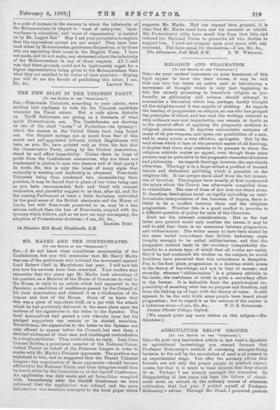RELIGION AND PRAGMATISM. pre TIC EDITOR OF TIM " SPECTATOR:1
SIR,—As your readers' comments on your treatment of this topic appear to have run their course, it may be well that one who has taken an active part in in.troducing a movement of thought which is only just beginning to tell, but already promising to transform religion as pro- foundly as philosophy and science, should attempt to summarise a discussion which has, perhaps, hardly brought all the enlightenment it was capable of yielding. As regards the bearing of pragmatism on religion, no one who has grasped the principles of either, and has read the writings referred to with ordinary care and impartiality, can remain in doubt as to the general effect of applying the pragmatic criterion to religious phenomena. It deprives rationalistic criticism of many of its pet weapons, and opens out possibilities of a new, and to many minds a very effective, apologetic. But by the very stress which it lays on the personal aspect of all knowing, it implies that there may continue to be persons to whom the religious attitude makes no appeal, even though these same persons may be quite alive to the pragmatic character of science and philosophy. As regards theology, however, the case stands otherwise. Theology is to a large extent a product of learned leisure and dialectical quibbling which is parasitic on the religious life. It has always stood aloof from the felt intensi- ties of devotion. Theologians have usually at first condemned the saints whom the Church has afterwards compelled them to rehabilitate. The case of Joan of Are does not stand alone. If, therefore, theologians insist on rigidly upholding an intel- lectualistic interpretation of the function of dogma, there is likely to be a conflict between them end the religious pragmatists. Whether this is a good coudict to provoke is it difficult question of policy for each of the Churches.
Such are the relevant considerations. But as the last letter you printed could only confuse the issues, it may be well to add that there is no connexion between pragmatism and utilitarianism. The writer seems to have been misled by the mere verbal coincidence that British hedonism came (ineptly enough) to be called utilitarianism, and that the pragmatic method leads to the corollary (unspeakably dis- tasteful to a certain type of mind) that all truths are useful. But if he had continued his studies on the subject, he would doubtless have perceived that the coincidence is deceptive. For, in the first place, pragmatism is a doctrine which arises in the theory of knowledge, and not in that of morals ; and secondly, whereas "utilitarianism" is a primary attitude in the latter, the usefulness of truth is quite a secondary affair in the former. It is deducible from the psychological im- possibility of asserting what has no purpose and function, and from the linking up of logic with the theory of value. It still appears to be the only truth some people have heard about pragmatism ; but to regard it as the essence of the matter is
a ludicrous error.—I am, Sir, &c., F. C. S. SCHILLER.
Corpus Christi College, Oxford.
[We cannot print any more letters on this subject.—En. Spectator.]









































 Previous page
Previous page